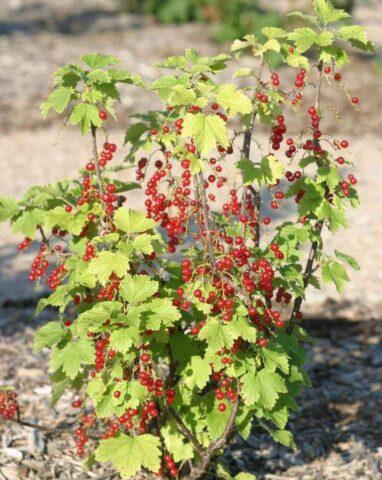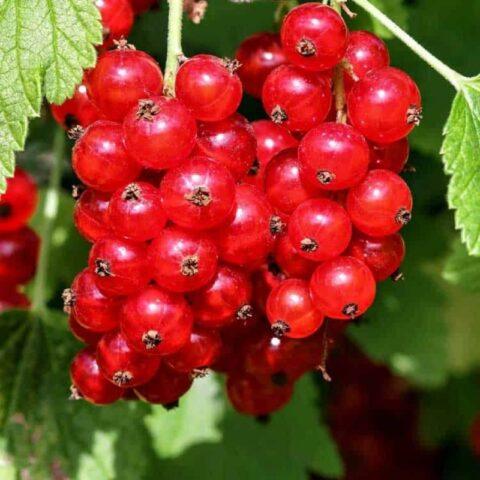Content
Alpha red currant is a successful result of the work of breeders. Unlike the "old" varieties, which have a number of disadvantages, this culture has become widespread among gardeners due to its characteristics.
Breeding history
The variety was obtained in the South Ural Research Institute of Fruit and Vegetable Growing. When creating it, the currants Chulkovskaya and Kaskad were used. V.S.Ilyin is recognized as the author of the culture. Since 2009, the red currant Alpha has been put up for state variety testing.
Description of the red currant variety Alpha
An adult shrub reaches medium size in height, no more than 70-80 cm. The plant does not differ in large spreading of branches and dense foliage. Young shoots are straight, of medium thickness. Buds are medium-sized, brown in color, deviated from the branch to the side.
The leaves of the Alpha red currant are five-lobed, small. Their color is dark green. On one side, the leaves have a shiny and wrinkled skin-like surface. The lobes are pointed, the middle one is larger than the lateral ones. The base of the leaf has a small indentation, resembling a triangle in shape.
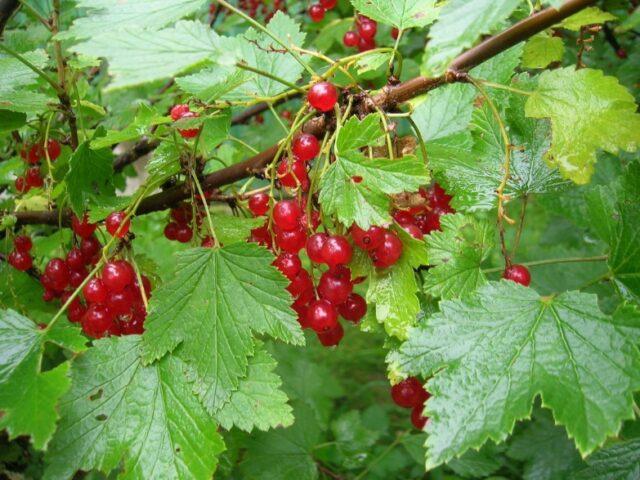
The petiole of the Alpha variety is long, medium thick, pinkish-green
The flowers are medium-sized, saucer-shaped in shape. The cushion is parapestal, poorly expressed. Sepal has a pale yellow color with a pink tint. It is closed in shape, slightly bent. The formed racemes are long and curved. Their axis is of medium thickness, it can be painted green or crimson. The petiole of the brushes is thin.
A distinctive feature of the Alpha variety is its very large berries. Each weight varies from 0.9 to 1.5 g. Fruits practically do not differ in size, have a rounded shape and light red color. The pulp inside the berries is the same shade as the skin, with an average amount of seeds.
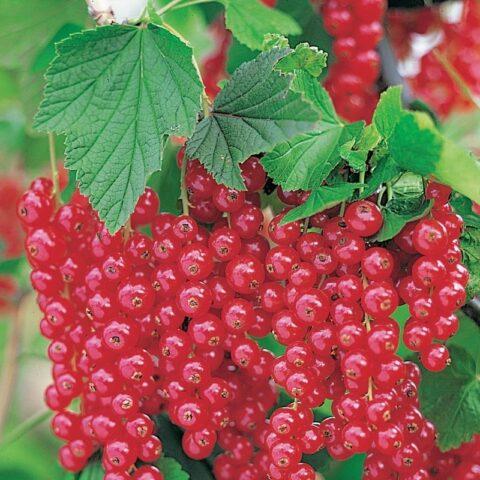
The taste of red currant is sweet and sour, got 4.7 points according to the tasting rating
The harvested red currants can be sold in various directions: eaten fresh, make jam or jams from it. Delicious puddings and fruit soups with the addition of berries are obtained.
Characteristics
Alpha red currant belongs to varieties that bear fruit well with proper care. Studying the characteristics of a plant allows you to choose a place for it on the site and draw up a plan of agricultural technology.
Drought tolerance, winter hardiness
Alpha red currant tolerates low temperatures well. In adult shrubs, the root system grows deeply into the ground, which allows the culture to safely survive frosts down to -30 ° C.
But the drought resistance of the shrub is average, the lack of moisture negatively affects the yield of the variety.
Pollination, flowering period and ripening times
Alpha red currant is a self-fertile crop, therefore it does not need neighbors. This advantage allows a shade-tolerant and light-loving plant to be planted in an area far from other trees and shrubs.
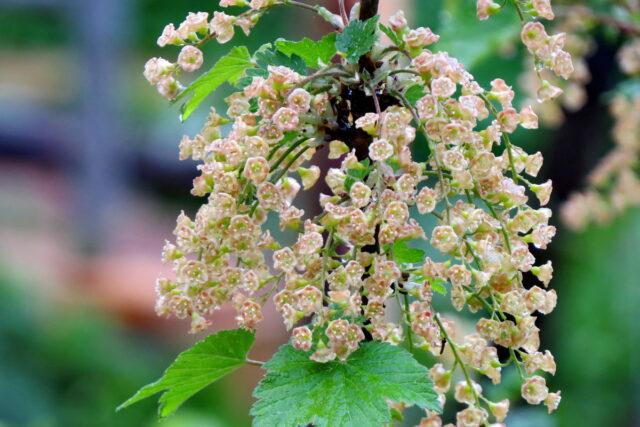
The flowering of currants can be observed in early May.
Ripening periods are average, so the harvest begins in mid-July in the Central Region.Unlike early varieties, Alpha red currants start singing two weeks later.
Productivity and fruiting
The culture is not only large-fruited, but also abundantly fruiting. With proper care, the average yield is 7.2 t / ha. The maximum can be collected up to 16.4 t / ha.
Each shrub can produce between 1.8 and 4.1 kg annually. Long periods of drought, as well as excessive watering, neglect of fertilizing and the rules of agricultural technology, adversely affect the fruiting level of the Alpha red currant.
Disease and pest resistance
The cultivar is known for its strong immune system: it is resistant to powdery mildew, which often affects various red currant varieties.
Among the pests, aphids, goldweed, spider mites and glassworm are dangerous for the plant. To avoid an attack, it is enough to carry out prevention in a timely manner. To do this, it is recommended not to neglect the rules of agricultural technology, to plant nearby crops that repel pests.
Very quickly, the activity of a gall aphid can be suspected. As the insect multiplies, currant leaves swell and change color to reddish-brown. If you do not carry out medical measures, then new shoots do not grow, and the leaves fall off.
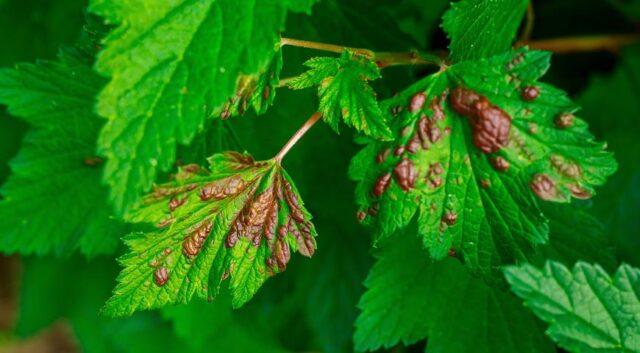
Such drugs as Biotlin and Fitoverm successfully fight against gall aphid on red currant Alfa
An obligatory stage of treatment is breaking off deformed leaves, and then destroying them.
A small beetle with a greenish-golden color of the shell is currant goldfish. The larvae of the pest damage the shoots, destroying their core. As a result of their activity, the branches dry up and die. If the beetle is not destroyed, then it will lay eggs, and next year the plant will suffer again from the larvae.
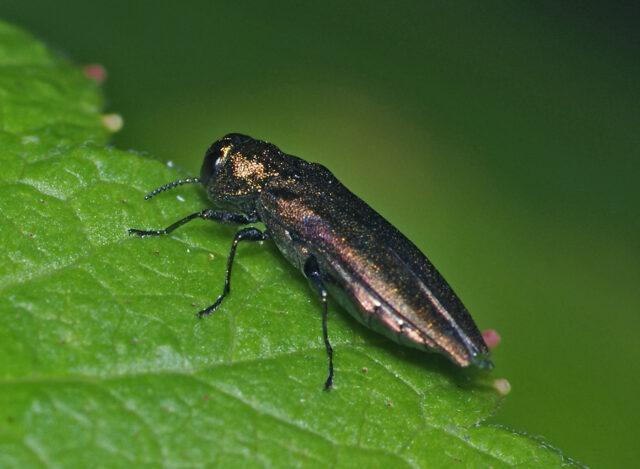
Sanitary pruning and spraying of the Alpha red currant bush with a 3% solution of karbofos are the main measures for the destruction of the pest
The spider mite feeds on young leaves and berries. To find it, it is enough to inspect the plant. Yellow and red spots appear on the underside of the surface. The pest entangles shoots with cobwebs.
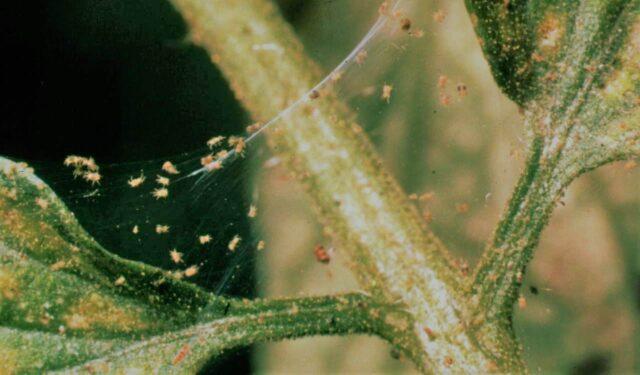
Effective against mites acaricides: BI-58 and Fufanon
When pruning in spring, you can find a black dot in the core of the branch on the shoots. This is the result of the activity of the glass pot, whose larvae gnaw the tunnels in the shoots. Without treatment, the bush dies from a lack of nutrients.
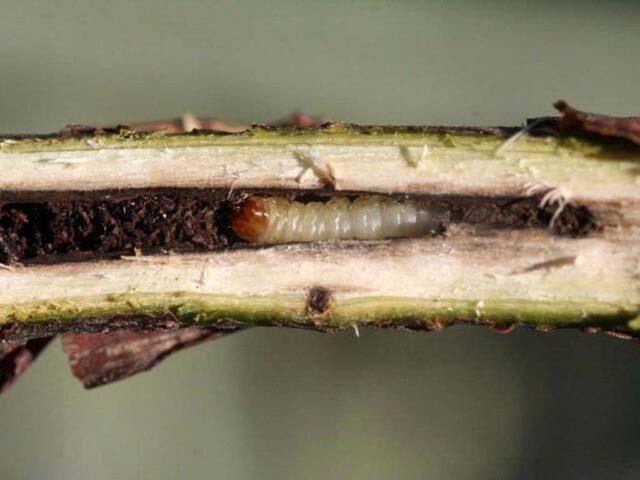
Alpha red currant treatment is to remove the affected shoots
Among the insecticides from the glass, a 0.3% solution of karbofos is effective.
Advantages and disadvantages
Alpha red currant is a high-yielding and large-fruited crop. The plant has a strong immune system.
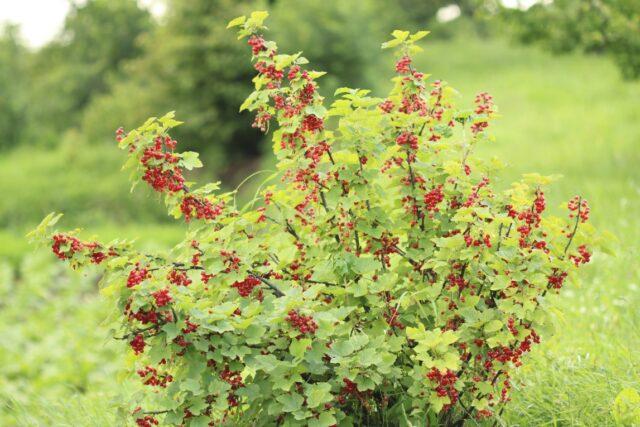
Bushes of a variety of medium spreading, with straight shoots, which makes it easier to care for currants
Advantages:
- self-fertility;
- frost resistance;
- dessert taste of berries.
Disadvantages:
- medium drought resistance;
- exactingness to the soil.
Features of planting and care
It is recommended to transfer the seedling to the open ground in the spring, in April-May. Autumn planting is also allowed, a month before frost. Alpha red currant bushes develop well in black earth, sandy loam or loamy soils. The soil should be fertile, with a neutral acidity level.
The optimal place for planting is a southern slope, well lit by the sun. On the north side, it needs to be sheltered from the wind. The Alpha redcurrant shrub grown in the shade will bear small and sour berries.
Landing Algorithm:
- Two weeks before the procedure, prepare a hole 40 cm deep and 50-60 cm in diameter.It is recommended to maintain a distance of 1-1.25 m between the bushes.
- Apply top dressing: compost, superphosphate, potassium sulfate and ash.
- On the day of planting, form a small mound at the bottom of the hole, place a seedling on it and spread its roots.
- Cover the Alpha red currant with earth and compact the soil mixture around its trunk.
- Pour 10 liters of water under each seedling.
- Mulch the trunk circle.
In order for the shrub to take root, at the end of planting, it is recommended to prune the branches, leaving shoots 10-15 cm long.
Variety care consists of watering, weeding and loosening. Prevention against pests is an obligatory stage of agricultural technology.
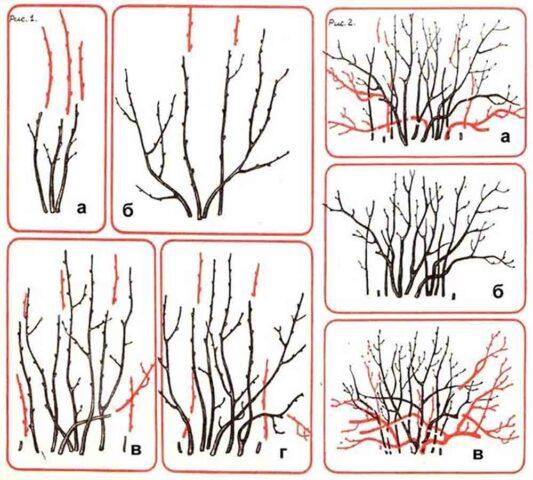
In order for the bush to bear fruit abundantly and safely endure winter frosts, it is necessary to prune in spring and autumn
In addition to sanitary and formative pruning, Alpha red currants need additional feeding. Urea or ammonium nitrate should be used as fertilizers. Complex preparations are also suitable.
Conclusion
Alpha red currant is a large-fruited and frost-resistant variety. The plant is light-requiring, does not like lack of moisture. The shrub bears fruit abundantly annually with proper care.
Reviews with a photo about the red currant variety Alpha
